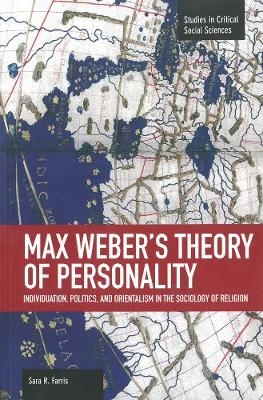
Max Weber's Theory Of Personality: Individuation, Politics And Orientalism In The Sociology Of Religion
Haymarket Books (Verlag)
978-1-60846-416-6 (ISBN)
Max Weber?s Theory Of Personality argues that the concept and problematic of personality plays a pivotal role within these works. Providing a detailed reconstruction of this concept within Weber?s systematic studies of world religions as well as throughout his methodological and political writings, this book shows its complex development within three strictly related problematics associated with Weber?s influential comparative historical sociology and theory of social action, individuation, politics and orientalism.
Sara R. Farris Ph.D., studied at the University of Rome La Sapienza”. She is Lecturer in Sociology at Goldsmiths University of London. She was Member Scholar at the Institute for Advanced Study in Princeton in 2012-2013. She has published on sociological theory, political sociology, orientalism, gender studies
Acknowledgements
INTRODUCTION
1. Max Weber’s Theory of Personality.
2. Individuation.
3. Politics.
4. Orientalism.
5. Organisation of the book.
6. Summary of the chapters.
1. FROM THE HISTORICAL INDIVIDUAL TO THE SOCIOLOGICAL PERSONALITY
1. Singularisation and individualisation of history.
2. The notion of individuality in 19th century historiography.
3. The Heidelberg school and the axiological foundation of the historical individual.
4. Universalism of values and anti-naturalism: logical antinomies and political implications.
5. Historical individual and subjective axiology in Max Weber.
6. Causality and rationality versus unpredictability and irrationality of action.
7. Towards a theory of personality.
2. A LEXICON OF INDIVIDUATION: BILDUNG, RELIGION, PERSONALITY
1. Introduction.
2. Religion, between the individual and society.
3. From magic to religion: disenchantment and rationalisation.
4. Conceptions of God in the Orient and in the Western World.
5. The theodicy of suffering and the religions of redemption as instrument.
6. Ascetic and mystical orientation.
7. Irrationalisation of ends, rationalisation of means: on formal rationality.
8. Religion and economics: negative dialectic and the birth of capitalism.
3. PURITAN PERSONALITY AND POLITICAL LEADERSHIP OF CAPITAL
1. A ‘partial’ synopsis.
2. Criticisms, condemnations and misinterpretations.
3. Avant le déluge: an anachronic approach to interpreting “The Protestant Ethic”.
4. Rationalisation and specialisation.
5. Weber versus the neo-humanism of Wilhelm von Humboldt.
6. Weber versus the realisation of individuality in Marx.
7. Puritan personality and political leadership of capital.
4. THE ROOTS OF RATIONALISATION: ANCIENT JUDAISM
1. Social stratification in ancient Palestine.
2. Jewish hierocracy: between bureaucracy and charisma.
3. The historicity of the world and the dislocation of authority.
4. On the utility and liability of marginality for Judaism: the community of the covenant and the pariah-people.
5. Collective emancipation versus individual salvation: the Jewish “personality”.
5. PARADOXES OF RELIGIOUS INDIVIDUALISM: ON WEBER’S SOCIOLOGY OF INDIA
1. The sociology of India. Hinduism and Buddhism.
2. Hinduisation, church and sect.
3. The caste system.
4. The dharma of caste, karma and samsara.
5. The heterodox religions: Jainism and Buddhism.
5. Egotism and conformism: religious individualism in India.
6. THE LAND OF THE ‘WELL-ADJUSTED MAN’: WEBER’S SOCIOLOGY OF CHINA
1. From feudalism to patrimonialism.
2. State bureaucracy and political capitalism.
3. On the sacred nature of tradition: the precarious equilibrium between centre and periphery.
4. Confucianism as a “religious ethic for cultivated men”.
5. The Taoist and Buddhist heterodoxies.
6. The theoretical challenge of Confucian rationalism.
7. On the absence of personality.
7. POLITICS AND ORIENTALISM OF THE OCCIDENTAL PERSONALITY
1. The Protestant sects and the Puritan personality.
2.. In the beginning was charisma
3..Homo politicus and homo puritanus.
4. The Asiatic non-personality
5. Homo asiaticus and homo bureaucraticus.
6. Concluding remarks: politics and orientalism of the Occidental personality.
Bibliography
Index
| Erscheint lt. Verlag | 25.12.2014 |
|---|---|
| Reihe/Serie | Studies in Critical Social Sciences |
| Verlagsort | Chicago |
| Sprache | englisch |
| Maße | 152 x 229 mm |
| Gewicht | 345 g |
| Themenwelt | Geisteswissenschaften ► Psychologie ► Psychoanalyse / Tiefenpsychologie |
| Geisteswissenschaften ► Religion / Theologie | |
| Sozialwissenschaften ► Ethnologie ► Volkskunde | |
| Sozialwissenschaften ► Soziologie | |
| ISBN-10 | 1-60846-416-4 / 1608464164 |
| ISBN-13 | 978-1-60846-416-6 / 9781608464166 |
| Zustand | Neuware |
| Haben Sie eine Frage zum Produkt? |
aus dem Bereich


